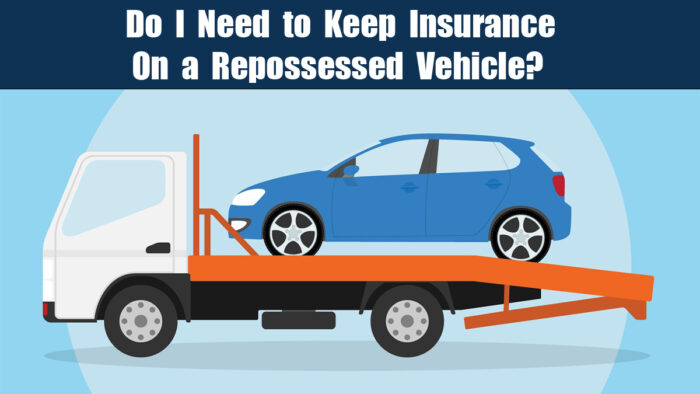If you obtained an auto loan and missed the deadline for payments, it could lead to losing your car. In a situation where you are unable to pay your auto loan, your lender has the right to seize your vehicle and sell it at auction to get the remaining amount you owe. If a situation like this occurs, the next question will be whether you need to keep insurance on the repossessed vehicle.

Most often than not, you are not required to keep auto insurance coverage on a repossessed vehicle that you no longer have access to. Once your vehicle is repossessed by your lender, the responsibility of keeping insurance coverage on the vehicle solely falls on your lender, not you.
Nevertheless, there might be some exceptions to keeping your insurance on a repossessed car, depending on the specific laws that govern your state.
To get more information about this question, ensure you read to the end of this article. We have helped to gather all the necessary information that would enable you to make informed choices.
How Does Repossession Work?
Repossession occurs when you do not meet the deadline for your auto loan payment. Once this happens, your lender will seize your vehicle and sell it out to get the remaining loan balance.
In some states, you are required to have minimum liability coverage for a certain period of time after your vehicle has been repossessed. This means the responsibility of insuring the vehicle still falls on you.
In our sincere opinion, we recommend that you review the terms of your loan agreement in order to have a better understanding of the exact requirements and conditions of your lender. This would also help you meet all the legal obligations as regards insuring a repossessed car.
Will Repossession Make My Insurance Rate Increase?
In most cases, repossession does not really affect your insurance rate since it is a financial issue rather than a liability. Therefore, it shouldn’t have an effect on your insurance rates or claims.
Nevertheless, this is not usually the case in a situation where the repossession has a negative effect on your credit score. Undoubtedly, your credit score influences how much your car insurance costs. So, if you have a bad credit score, it might affect your insurance rate.
What Happens to the Insurance of a Repossessed Vehicle?
Having your vehicle repossessed can be a stressful experience. Once your vehicle is seized by your lender, you can proceed with canceling your auto insurance policy.
However, keep in mind that you will likely lose a discount if you cancel your policy after you have continuously insured your vehicle for 6 months or more. But if you do not plan on getting a new vehicle for an extended period of time, you can proceed with canceling your policy.
Overall, we advise that you pay your bill and update the vehicle on your policy once you get a new vehicle. This would help you save money on your car insurance policy.
What to Do If Your Vehicle Gets Repossessed
In a situation where your car is repossessed by your lender and you intend to get a new car, consider the following tips:
- Understand Your State Laws: Before taking out a loan, ensure you are aware of the laws that guide loan agreements. Through this, you will be able to know when your lender is expected to notify you before your vehicle is repossessed. To stay informed about the law that governs repossession in your state, you can consult your state’s attorney general’s office.
- Retrieve Your Personal Possessions: If your lender seizes your personal property alongside your vehicle, it is very wrong. Take steps on how to retrieve your personal belongings by reporting the case to an authorized person who can contribute to getting your belongings back.
- Try to Reinstate the Loan: In some cases, you may be able to reinstate your loan after paying out the previous loan amount, including the repossession expenses incurred by your lender.
- Consider Getting Your Vehicle Back: If you can afford to buy your vehicle back, you can speak with your lender and agree on the terms and conditions attached to getting your vehicle back. However, this depends on the state in which you reside; if your state permits it, then you can.
- Reevaluate Your Financial Situation: This is also one of the most important things to do when your vehicle is repossessed. Ensure you factor in your financial situation and check if there are ways you can make changes to your budget and expenses.
Above all, take steps to boost your credit score by establishing good credit habits that are free of unnecessary expenses.
FAQs
What can I do if I’m behind on my auto loan payment?
There are cases where individuals are unable to meet up with the usual way of making payments on their auto loans. Here’s what to do.
You can speak to your lender and make sure he or she understands why you won’t be paying within the specified timeline. In most cases, some lenders may agree to extend your payment timeline if you provide them with a substantial reason.
You can also file for bankruptcy in order to prevent your car from being repossessed by your lender.
If I fail to meet up with my auto loan, how quickly can my lender repossess my car?
The majority of loan agreements specifically state the penalties attached to late payments. In most cases, your lender may give you a grace period to pay your loan amount.
We advise that you try as much as possible to meet up with the grace period given to you. Anything that happens after then will no longer be the fault of the lender.



